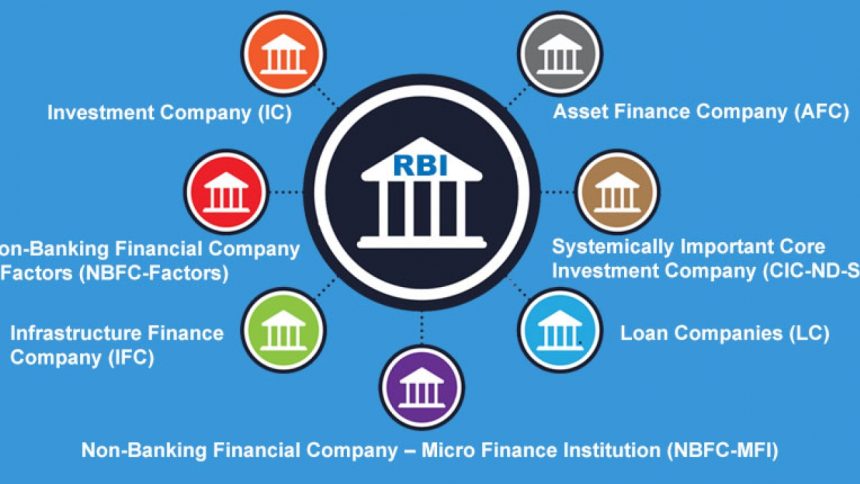Understanding the language of finance can sometimes be like unraveling a cryptic puzzle. Non-Banking Financial Companies (NBFCs) can really make finance lingo seem confusing. But we got you! This article will delve into what really is NBFC.
What is an NBFC?
In simple words, think of an NBFC as a financial company that follows the rules set in the Companies Act of 1956. They do money-related things like leasing, providing insurance, lending money, and dealing with financial stuff like stocks and bonds. However, they stay away from activities like real estate, making and selling regular stuff, farming, or running factories.
Also, if a company takes money from people in the form of deposits under different plans, it’s still considered an NBFC, just a special kind called a Residuary NBFC.
Principal Business
One key distinction between an NBFC and other business models is the use of the term “principal business”. For a company to be considered an NBFC, the Reserve Bank of India (RBI) requires that more than half of its total assets are financial assets and that over half of its total income comes from these assets. This is how they determine if a company qualifies as an NBFC or not. This “50-50 test” makes sure that the only businesses governed by RBI regulations are those that are primarily involved in financial activities.
- Advertisement -
Differences Between Banks and NBFCs
NBFCs and traditional banks appear to provide comparable financial services, but there are some important differences:
- Acceptance of Deposits: Unlike traditional banks, NBFCs are unable to accept demand deposits. Checks cannot be written from an NBFC account, and they do not offer checking accounts.
- Payment and Settlements: Since NBFCs do not participate in the official payment and settlement process, they are unable to write checks payable to themselves. This indicates that they don’t offer the same infrastructure for payments as banks do.
- Deposit Insurance: Unlike banks, non-bank financial companies (NBFCs) do not provide deposit insurance via organizations such as the Credit Guarantee Corporation or the Deposit Insurance. As a result, depositors using NBFCs might not be as protected as those using conventional banks.
Is Registration with RBI Necessary?
There are certain rules one needs to follow by the Reserve Bank of India to be an NBFC. First, have yourself registered with them, and second you should also have at least ₹2 crores in your bank. However, there’s a twist – some NBFCs don’t have to follow these rules if they’re already playing by different rules under other regulatory bodies. For example, insurance companies, venture capital funds, and stockbrokers get a bit of a pass.
To become an NBFC, a company needs to check a few boxes. First, it should be a registered company under the Companies Act of 1956. Second, it needs to have at least ₹2 crores saved up in its financial piggy bank. But, keep in mind, if a company specializes in certain kinds of financial business, that savings requirement might be different.
Types and Categories of NBFCs
NBFCs come in various types, categorized based on their activities, liabilities, and size. Some common types include:
- Asset Finance Company (AFC): Primarily involved in financing physical assets for economic activity, such as machinery, vehicles, and industrial equipment.
- Investment Company (IC): Engaged in the acquisition of securities.
- Loan Company (LC): Provides financing for activities other than its own.
- Infrastructure Finance Company (IFC): Focused on infrastructure loans.
- Systemically Important Core Investment Company (CIC-ND-SI): Specializes in acquiring shares and securities.
- Infrastructure Debt Fund – Non-Banking Financial Company (IDF-NBFC): Facilitates long-term debt flow into infrastructure projects.
- Non-Banking Financial Company – Micro Finance Institution (NBFC-MFI): Offers microfinance services.
- Non-Banking Financial Company – Factors (NBFC-Factors): Engaged in factoring services.
- Mortgage Guarantee Companies (MGC): Provides mortgage guarantee services.
- NBFC – Non-Operative Financial Holding Company (NOFHC): Acts as a holding company for promoters of new banks.
In conclusion, NBFCs are crucial participants in the financial industry, providing a vast array of services that intersect with those provided by conventional banks. Even though they have certain limitations—like not taking demand deposits—knowing their function and classifications can make it easier for people and companies to deal with the intricate world of finance.


